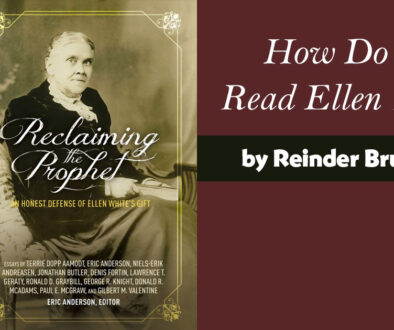A Painful Addiction
by Andrew Hanson
By Andy Hanson, September 17, 2013
You might say I must be addicted to official church publications. I’m the only one in my circle of Adventist friends that religiously, pun intended, reads every issue of the Review, World, and Ministry Magazine. I use the word “addicted” because I don’t seem to get through even one issue without experiencing intellectual and spiritual heartburn.* Consider the following:
The elect are reviving and reforming while cruising the Mediterranean, Inland Passage, or vacationing in Israel, along with Adventist media personalities while conversing about the future of Adventist faith.
Angel Manuel Rodriguez affirms the historical fact of Creation and the Flood. Ellen White is quoted: Without Bible History, geology can prove nothing. Clinton Wahlen, an Associate Director of the Biblical Research Institute, claims that once the biblical account of Creation is undermined, it is easier to find reasons to reject its message regarding the two original institutions: marriage (between a man and a woman) and the seventh-day Sabbath. He concludes that higher criticism…is robbing God’s word of power to control, uplift, and inspire human lives.”
Clinton and Gina Wahlen argue that God is not a moral monster even though “the Bible does contain some troubling images of God, but faith helps us grapple with [God’s command to exterminate] the Canaanites.”
Frank M. Hasel obviates: To insist on Scripture alone (sola scriptura) is more than giving Scripture primacy over other sources in theology. Sola scriptura affirms that Scripture is the sole source of its own exposition. This makes Scripture foundational for theology. Only a symphonic reading of the whole Bible will do justice to the multiplex phenomena of Scripture under the unifying guidance of the Holy Spirit.
Richard Litke invites pastors to read a National Geographic Magazine article to see the mummified face of the woman who tried to adopt the boy Moses as her own son, and who later failed in her quarrel to make him the next king of Egypt.
Then there is the new Doug Batchelor book, Revelation: the Bride, the Beast & Babylon with a cover that features two seductive women and a spooky dragon with wings and seven snake-like appendages.
The Idaho Conference is sponsoring the seminar for today’s world based on Daniel 11’s Time of the End prophecy.
Cliff Goldstein believes that absolute truth is a transcendent metaphysical standard by which everything is judged such as what the Bible teaches… And if one culture teaches you to love your neighbors, another to eat them, who determines which one is superior? And Jovan Ilijev agrees that if there is no God, there are no objective moral values.
Because living creatures die, Cliff warns his readers to base hope on religious belief, no matter the waft of cherries and the glitter of new galaxies…cherries often rot on the bough and the “new galaxies” might have already died…Our hope can’t be in the natural but only in the supernatural because the natural now leads only to an eschaton of worms.
Grenville Kent testifies that some atheists want honest dialogue…have reason and intuition, the ability to love, some innate knowledge of right and wrong, a sense of purpose—because they are created in God’s image, whether they recognize it or not.
Michael Doernbrack urges readers to believe that Genesis 3 is not the chapter that shows how God kicked Adam and Eve out of Paradise. It is a chapter that draws a beautiful picture of the character of God and ultimately reveals the gospel.
Martin Proebstle discusses an incident in which God wanted to kill Moses because his son was not circumcised. Moses needed to circumcise his son and exhibit the covenant sign in his family before he would lead Israel out of Egypt. Touching Moses’ genitals with circumcision blood seems then to be a symbol for Moses’ reinstatement into God’s covenant. Thus his son’s circumcision saved Moses’ life.
James Park opines that an individual’s or a country’s openness to the gospel is greatly affected by the amount of change or trials they are facing. He quotes George Knight:
Whenever riches have increased, the essence of religion has decreased in the same proportion…But as riches increase, so will pride…and love of the world in all its branches…So although the form of religion remains, the spirit is swiftly vanishing away.
Must Love God. Those words, in bold type over an inch high, dominated the cover of the February 14, 2013 Review.
*Reader, if you care enough to want references to any of these passages, I will be happy to provide them via email. aphanson@csuchico.edu If you want to know why each of these extracts gave me heartburn, cite a specific passage online, and I’ll provide an online answer.



